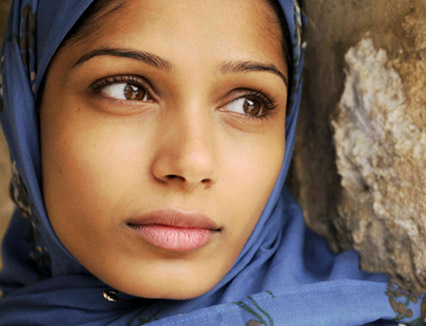The film is a version of the autobiographical novel of the same name by journalist Rula Jebreal, who also wrote the screenplay, about growing up in Palestine in the 1980s. Schnabel and Jebreal are now in love, (did I mention she looks like, and is groomed as, a supermodel?) and from my perhaps ungenerous perspective, the film is shaped by Schnabel’s obvious romance with the brown world, albeit a feminized one, which he claims he only recently discovered (although his prior films Basquiat and Before Night Falls are precedents). A cynical mind might call this “trauma tourism,” the appeal of stories from the underdeveloped world being their cathartic effects. We are left by his film with a light sprinkle of therapeutic tears, not the kind of itchy political ire I was hoping for. Where’s Brecht when you need him the most?
Schnabel begins the story before the establishment of Israel, and follows the lives of three generations of women. The first section belongs to the historical figure Hind Husseini, (Hiam Abbass). After the first invasion setting up Israel, Hind finds a group of orphaned Palestinian children and opens a school for them on her father’s estate (whose wealth goes unexplained). She refuses any state aid, and runs it privately, to avoid political involvement. The orphanage is our home site throughout the film. What better way to win the hearts and minds of Americans than the raw innocence of children and women? And a privately run institution? The second section belongs to Miral’s mother, Nadia (Yasmine Al Massri). Surviving a childhood of sexual abuse, she turns to drinking and self-destruction but not before marrying a wonderfully supportive man (Alexander Siddig). After all, personal tragedy sells better than mundane, collective suffering. The last chapter is Miral’s, played by the Indian actress and ex model (see Slumdog Millionaire) Freida Pinto, who is unconvincing and miscast.This film was hard for me to watch, but not for the reasons I was hoping it would be. I wanted it to be hard to watch because it was unforgiving, like a Waltz with Bashir from the point of view of the Lebanese the night of the Sabra and Shatilla massacres; I wanted it to capture the existential stench of war. But no. Miral was just too achingly beautiful to carry the politics I wanted it to manage.
At first I thought it was because Freida Pinto is so painfully gorgeous. I found her blinding beauty very distracting, partly as she seems so self-conscious of it, and a bit simpery. All I could think of as I watched was how thoroughly this ex-model worked that red carpet after Slumdog Millionaire. As Miral, her giggles and tears throughout the film drew me more to Elle than Al-Jazeera. At one point a 17- year-old Miral aids the PLO, and is caught by Israeli police. Brought to the station she is hung by her wrists and whipped by a stern matron (anyone remember Lina Wertmüller’s Seven Beauties?). But even the torture scene became sexy, kind of kinky and voyeuristic, in that ‘innocent girl caught in a big bad world’ kind of way.
Then I realized, it was not Freida that distracted me but the overall aesthetic sensibility of the film, its painterly virtuosity. With the lighting, camera work and color scheme, the film strikes a rich, major key that obscures the harshness of the lives it is trying to honor. In one scene Miral and her hot PLO member boyfriend Hani (Omar Metwally) enjoy a cuddle as they talk politics. Which would be okay, (though I don’t really like my politics mixed with romance, but that’s just old curmudgeonly me) except that their sun-kissed good looks — his rugged bone structure and piercing eyes, Miral’s perfectly white teeth and glossed lips — transport us to a Calvin Klein commercial. The drab, dull, dirty, aging nature of living under oppression is scrubbed as clean as Miral’s perfectly smooth skin. At some points the film does try to identify the urgent, with an occasionally shaky camera, and a mournful, melancholy but lush musical score gives a lyrical refrain for the film’s chapters. But even the music is too beautiful.
Now there is nothing wrong with beauty, which can exist in stark contrast to its surroundings. Rula Jebreal is herself unbelievably photogenic. And the film is careful not to aestheticize violence. But the beauty of it avoids the starkness of the dystopian war-torn terrain. It obscures the ugliness of poverty, the grotesque banality of endless war, the broken teeth and pocked skin caused by living under the constant stress of apartheid.
The film gives us what we expect from a well-funded and distributed film — a comforting symmetrical narrative with a predictable arc, a coming of age story inviting our emotional identification, an overemphasis on personal relationships and romantic involvements, oversimplified politics rather than the often dry, complicated and morally ambiguous. I yearned for at least a touch of Brechtian distance.
Instead, this film retracts whatever political promise it may have extended. Our passionately righteous insurgent Hani changes. Without giving too much away, the film’s resolution takes the easy way out of showing the militants to be their own worst enemy, and ends, conveniently, with the Oslo accords; the film stops dead in its tracks in 1994. There is no reference to Israeli destruction since then, or the recent events in Gaza. It ends simply with a euphemistic “the Oslo agreement has not been honoured yet.” Miral, with her perky nose, slumbering eyes and moist lips, sums up the film for us; “Why can’t we have one country for everyone? Like New York City?” Maybe we are supposed to laugh at her rather unbelievable naïveté, but that seems about the depth of the film’s political message.


